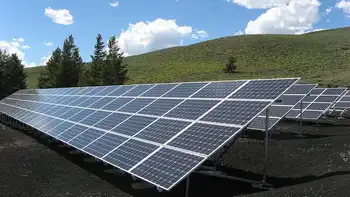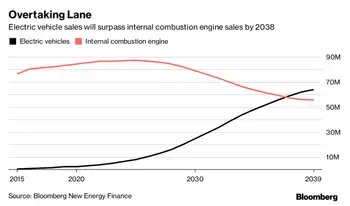Ontario needs electric rail before electric cars
By Globe and Mail
High Voltage Maintenance Training Online
Our customized live online or in‑person group training can be delivered to your staff at your location.

- Live Online
- 12 hours Instructor-led
- Group Training Available
The novel proposal for a regional high-speed rail network emerged in a paper prepared by senior engineering professors as background to Ontario in the Creative Age, a report commissioned last year by the McGuinty government to recommend responses to economic challenges that have since turned critical.
Of all the possible forms of new infrastructure the current crisis will call forth, they say, the most advantageous would be an electric rail network that transforms a sprawling region into a closely linked network of urban nodes.
"You can't go any faster by automobile," Professor Christopher Kennedy, the study's lead author, said in an interview.
"Even if you don't have congestion, you can't go fast enough. But if you go for a regional strategy that's based on high-speed rail, you can link places like Niagara, Waterloo and Toronto so they're actually within commuting time."
Noting that large-scale changes in infrastructure "are often driven by desperate circumstances," the paper examines three possible results of Ontario's struggle to obtain reliable supplies of clean energy.
It argues that current plans, which include a $100-billion investment in electrical supply and public transit, won't be enough to change a system based on cars and trucks running on expensive fossil fuels. The only way to do that, according to the engineers, is to make even larger investments in new electric infrastructure.
One scenario, which the authors dub "Electricity Nexus," posits new generating capacity sufficient to satisfy a quarter of the province's appetite for gasoline and diesel to fuel personal vehicles. Although politically challenging, the shift would be surprisingly affordable and "enormously attractive," they include.
"The reduction in air pollution within cities would be noticeable and at times dramatic."
Turning Ontario into a leading producer and consumer of electric vehicles is an obvious solution to the immediate crisis, according to Prof. Kennedy, but the long-term payoff is limited. "If we take all the existing automobiles and replace them with electric vehicles, we might have improved air quality, but we've done nothing about congestion, auto-dependency or the high costs of transportation," he said. "We haven't improved quality of life that much."
For that, the authors prescribe trains. "A high-speed rail network knitting Ontario's cities together could revolutionize the province's role within the continental and global economic systems," they write.
Like the road system built in the last century to accommodate cars and trucks, the new infrastructure will promote productivity and expand markets, according to Prof. Kennedy. Where the road system enabled large-scale industrial production, he said, the new rail system would serve the new economy by means of the "increased interaction between people with ideas."
A 560-kilometre system "would likely cost between $4-billion and $20-billion," the report estimates. "The effect should be some combination of increased market sizes, increased leisure time and a fitter population - all of which could help generate new forms of consumption."
In keeping with the theme set out by the lead report, the engineers call their proposal "Infrastructure for the Creative Age." The thinking is certainly that - and as such a welcome antidote to conventional wisdom about Windsor and Quebec.











